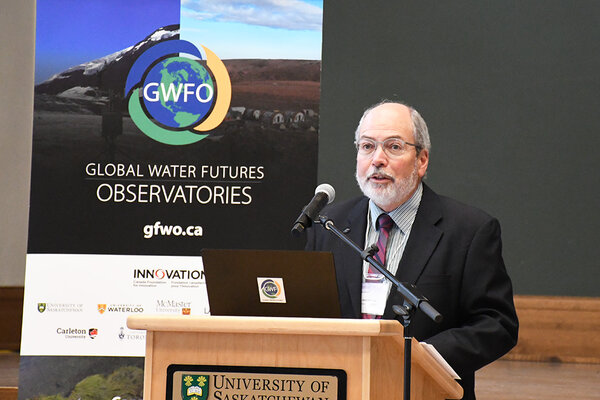
High-achieving USask mathematical physics graduate to receive Dean’s Medal at Fall Convocation
Edward Utama will also receive his Bachelor of Science (honours) degree in mathematical physics, with high honours, and the University Medal in the Sciences
By Shannon Boklaschuk
Nov. 10, 2021, will be a day of celebration for Edward Utama.
It’s the day Utama will officially become a University of Saskatchewan (USask) graduate and receive his Bachelor of Science (honours) degree in mathematical physics, with high honours, during USask’s virtual Fall Convocation event. His outstanding academic achievements will also be recognized with two major Convocation awards: the University Medal in the Sciences and the Dean’s Medal.
“Receiving the medals is truly an honour,” he said.
The Dean’s Medal is awarded annually at Fall Convocation to the most distinguished graduate of USask’s College of Arts and Science selected from among the recipients of the University Medal in the Sciences, the Rose Litman Medal in the Humanities, the University Medal in Social Science, the University Medal in the Fine Arts and the University Medal in Bachelor of Arts and Science Degree.
Utama first realized his academic strengths as a student at Saskatoon’s Bishop James Mahoney High School. That’s when he had the opportunity to participate in a program sponsored by the Canadian Light Source and USask—an experience that led to him enrolling in the College of Arts and Science.
“That gave me a taste of analyzing data and I was fascinated with the process of translating numerical data into physical results,” he said.
Utama was born in Indonesia and lived there for 13 years before moving to Canada in 2013 with his family. He believes his interest in mathematics was piqued as he began learning English in his new home; math became his “comfort subject,” he said, because he could understand it well even as he was developing his English skills.
At USask, Utama found his perfect fit in the mathematical physics program, a subject area that draws inspiration from both mathematics and physics and is characterized by conceptual, mathematical frameworks that describe or explain physical phenomena. During his undergraduate studies he had the opportunity to work alongside USask scholars at the Centre for Quantum Topology and Its Applications (quanTA), after receiving a highly competitive Natural Sciences and Engineering Research Council of Canada (NSERC) Undergraduate Student Research Award (USRA).
Utama’s project at quanTA focused on quantum wires—materials with unusual properties that make them ideal components for novel devices such as quantum computers—and was supervised by Dr. Steven Rayan (PhD) and Dr. Jacek Szmigielski (PhD), faculty members in the Department of Mathematics and Statistics in the College of Arts and Science.
“The project was theoretical in nature and, as such, was appealing for Edward, as he could put his mathematical skills and his facility with computer experimentation in motion,” said Rayan, quanTA’s director and the chair of USask’s mathematical physics program.
“It is worth noting that the pandemic had descended just before his project began,” Rayan added. “As such, we were faced with the reality that the entire project would need to be conducted virtually. While Dr. Szmigielski and I were very willing to scale back the scope and ambitions of the project, Edward insisted on working to meet the original goals. He persevered, and the quality of the project was not impacted at all. In the process, he demonstrated a remarkable independence in fully exploring our suggestions to him and in teaching himself advanced concepts as necessary.”
Utama said he’s grateful to Rayan and Szmigielski for their support as he applied for the NSERC USRA, and for their guidance at quanTA.
“Working at quanTA was an experience that I’d never trade for anything else,” he said. “I never thought that I’d start losing sleep for ‘work’ simply because I was itching for a solution. It was the first time I had the genuine thought of ‘I can do this and get paid? Wow.’ ”
Utama continued working under the supervision of Rayan and Szmigielski for his mathematics honours thesis in 2020-21, which became an expanded version of his prior summer project at quanTA. Utama “was able to characterize the mathematical underpinnings of quantum wires in terms of linear algebra, which is very appealing both for conceptual and computational applications,” Rayan noted.
“He wrote a beautiful thesis,” Rayan said. “I am very proud of Edward, not only for his mathematical accomplishments here, but also for the cogent communication of scientific ideas in his thesis. The thesis could eventually become a reference for many seeking to understand and realize quantum wires. Moreover, it is important to note that, in parallel with his MATH 402 thesis work, he completed an entirely separate capstone project through the physics and engineering physics department, which I find deeply impressive.”
Utama’s second senior-year project was done under the supervision of Dr. Tom Steele (PhD), in the College of Arts and Science’s Department of Physics and Engineering Physics. Utama said he explored a relatively new approach in theoretical physics that would allow for the computation of some fundamental quantities from quantum physics in a novel way.
Utama excelled throughout his time in the College of Arts and Science, earning numerous awards and honours along the way, such as the Ross John Kirk Scholarship, the Richard Blum Award in Mathematics, the B.W. Currie Memorial Scholarship, the Akira Hirose Memorial Award and others. He is now planning to apply for jobs and is also eyeing graduate studies in the future.
Utama said he will be forever grateful to Rayan, Szmigielski and Steele for providing him with opportunities to learn and to conduct research under their supervision.
“I think the best part of being a USask student is the small class sizes,” he said. “Particularly in my case—where there’s almost always less than 20 students per class—being able to just hang out and talk with the prof after class ended about tangents that popped up during the lecture is probably one of the best experiences.”


